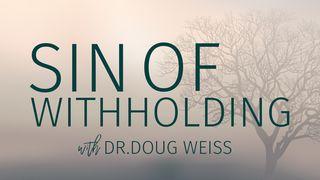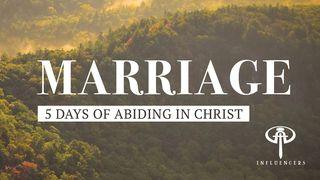Love Restored - A 7-Day Plan from Dr. John KoesslerSample

The dividing line between what is prohibited and what is allowed in this particular commandment has to do with ownership. It is fine to want a spouse or a servant or an ox or donkey. But anything that already belongs to someone else is forbidden. You cannot treat them as your own. You cannot take them by force. Indeed, the language of the commandment is much stronger. You must not even want them. This command strikes at the heart of all the sins associated with the commandments that precede it because it aims at desire itself. Sin always begins with desire. Our desires, even the desire for what is ordinary and allowable in other contexts, can make us captives. We find sexual lust the most interesting of the seven sins that the church has traditionally considered to be capital. Sexual lust is the besetting sin of the books, television shows, and movies that entertain us. But desire can be expressed in many different ways and shows up in the other capital sins as well. It is a mistake to dismiss sexual lust as a moral anachronism. But limiting lust to sex is too narrow. Dorothy Sayers notes, “A man may be greedy and selfish; spiteful; cruel, jealous, and unjust; violent and brutal, grasping, unscrupulous, and a liar; stubborn and arrogant; stupid, morose, and dead to every noble instinct—and still we are ready to say of him that he is not an immoral man.”
A one-sided view of lust causes the church to send mixed messages regarding lust. Many biblical conservatives are deeply concerned about the normalization of homosexuality. They rightly consider this particular form of immorality to be a threat, not only to the individual’s soul but to the future of society as a whole. They do not, however, seem nearly as troubled by heterosexual immorality, which many in their circles have practiced for some time. They emphasize the Bible’s explicit condemnation of homosexuality while ignoring its equally explicit condemnation of divorce. Furthermore, the public failure of notable leaders among some of the most conservative churches in other areas of lust, a lust for power, money, and sometimes sex, has exposed not only a lack of self-awareness but an accompanying moral blindness. This has prompted proponents of homosexuality and same-sex marriage to accuse biblical conservatives of hypocrisy, perhaps with good reason.
Others consider homosexual behavior sinful but say that it is no worse than any other sin. Those who take this softer view urge us to stop focusing on the particular sin and instead concentrate on God’s loving acceptance. Unfortunately, this supposed grace-oriented approach is often interpreted as a dismissal of sin altogether. If we all lust and every lust is the same, why worry about any of it? Not only does this view ignore the seriousness of sexual sin, but it also minimizes the sin of lust. Neither approach offers practical help to the person who is struggling with lust. They draw the boundaries, either narrowly or broadly, but they do not tell those who are struggling with sexual lust what to do when they find themselves out of bounds.
Ironically, neither does Jesus when he addresses the subject of lust in the Sermon on the Mount. Jesus does not offer four steps for dealing with the problem of lust. Instead of talking about preventive measures, Jesus limits Himself to definition. Jesus’ teaching actually intensifies the problem by making it clear that lustful intent is as wrong as the act itself. Jesus’ teaching exposes the true boundaries of what constitutes sin in God’s eyes and condemns us all. According to Jesus, there is more to sin than the deed. It is possible to avoid the action and yet not escape the sin that prompts the act. Martyn Lloyd-Jones uses a medical analogy to explain Jesus’ intent: “Sins are nothing but the symptoms of a disease called sin and it is not the symptoms that matter but the disease, for it is the disease that kills and not the symptoms.” It’s important to understand that our struggle with lust is much larger than the desire for sex. In the New Testament, the Greek term that is translated “lust” refers to desire. It can speak of both legitimate and illegitimate desires. In its sinful form, we may fix our desire on many things. It is just as likely to be focused on someone else’s possessions or on their success as it is to be an illicit desire for sex. John hints at the full scope of this cardinal sin in 1 John 2:16: “For everything in the world—the lust of the flesh, the lust of the eyes, and the pride of life—comes not from the Father but from the world.” As far as John is concerned, when it comes to lust, everything in the world is a potential target. Lust is such a common feature of our culture that it is hard to find a dimension of our experience that is not somehow shaped by it. Sexual lust is the point of appeal for many of the products that marketers try to sell to us. If lust is not the direct focus of most of the entertainment we consume, it is at least the garnish that its creators use to hold our attention. But this biblical sin has become so commonplace in our culture that it is almost a cliché. Lust’s commonplace status does not make it less dangerous to us. If anything, overfamiliarity increases our vulnerability. We have become desensitized and are therefore too tolerant of it, both in our environment and in our own experience. But the biblical sin of lust has many faces, and sometimes its sexual form is only a symptom of something else.
Discussion Question:
In what way is our struggle with lust much larger than the desire for sex? What is the ultimate answer for lust?
Scripture
About this Plan

In this 7-Day plan, Dr. John Koessler reveals how lust, which once was considered a "deadly sin", has transformed into a "dangerous virtue." Our culture has radically redrawn its moral boundaries so that what lust is now called love and sexual preference is regarded by many to be malleable. Dr. Koessler helps reveal the beauty of God's design for love and desire. Excerpted from the book 'Dangerous Virtues.'
More
| We would like to thank Moody Publishers for providing this plan. For more information, please visit: https://www.moodypublishers.com/books/current-issues/dangerous-virtues/ |









